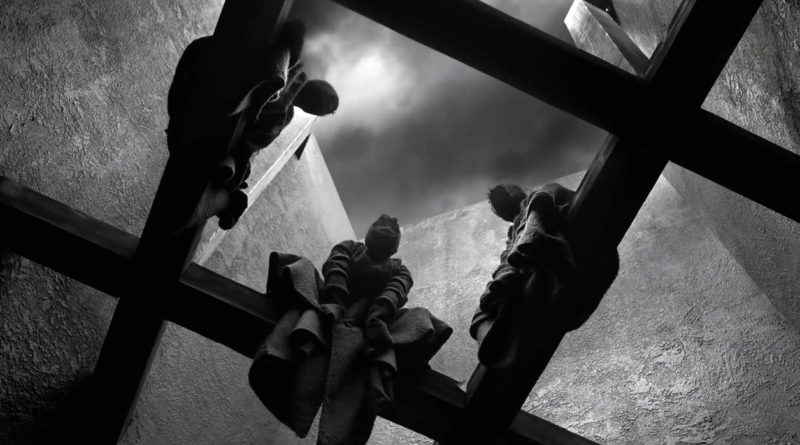‘The Tragedy of Macbeth’ Review: Stylish, but Still Macbeth
The cinema powerhouse known as the Coen Brothers has officially broken up, at least for now, with Ethan turning his attention to other things while Joel continues to make movies. Taking an interesting turn for his first solo outing, Joel has opted to adapt Macbeth for the screen, starring Denzel Washington as the tortured king and Frances McDormand (Joel’s wife and co-producer) as the manipulative queen. It’s decidedly un-Coen subject matter, and it’s done in an interestingly Coen-esque way.
The film’s style is perhaps its most interesting element. Stripped to the bare essentials, the film uses a minimalist, almost abstract way of delivering the story. The sets are largely empty, walls bare, with some scenes taking place entirely in environments sculpted of light and shadow. Bruno Delbonnel’s masterful black and white cinematography does a lot of heavy lifting, creating stunning environments out of a few carefully placed lights and little else, bringing a level surreal psychological intensity to the world of the film that is reminiscent of the German expressionist movies of the 1920s and 30s as well as the work of directors like Ingmar Bergman. The shot framing and editing is distinctly Coen-esque if perhaps a bit more measured and simplified for the style of the movie. While the Deakins-style wide-angle closeup is discarded, shots are still presented using simple, matter of fact framing that flattens the image and gives everything an ironic quality stemming from the lack of affect, one that is further enhanced by the sharp, punchy editing.
As this is Shakespeare, the performances become the focal point, and they are good all around. Many of the actors have theater training and bring with them a kind of mannerist style we have come to associate with Shakespeare’s work, although the leads manage to bring some of raw intensity that is lacking in other portrayals. Frances McDormand steals the show, delivering an excellent performance throughout, especially in bringing to life Lady Macbeth’s descent into madness in ways that Shakespeare’s text fails to do. Denzel also does a very good job, although he starts off slow, playing the role fairly straight, before breaking out and starting to have some fun with the part in the latter half.
The biggest problem with the movie is its faithfulness to the source material. I have always found Macbeth to be a fairly middling play, plagued by plot holes and silly contrivances that quickly become distracting and detract from the poetic psychodrama about power, greed, sin, and betrayal that is at the center of the narrative. The film, in its abstract simplicity, portrays the events of the play often exactly as written, down to all the little contrivances of the stage that really have no place in film. As a result, it suffers from many of the same problems as the source text. For one of the best adaptations of the play, and arguably one of the best Shakespeare movies ever, check out Justin Kurzel’s 2015 adaptation, which does a great job of changing or taking poetic license with aspects of the source text that would otherwise ring hollow or false if they were presented on screen in their unaltered form.
Joel Coen’s solo debut is by no means a failure, although it is not a great success either. Its style and storytelling methods are truly something to behold, and the performances from the main cast are enjoyable as well, however it is continually hamstrung by the fact that it is, in the end, Macbeth, and that Macbeth isn’t all that great to begin with.




